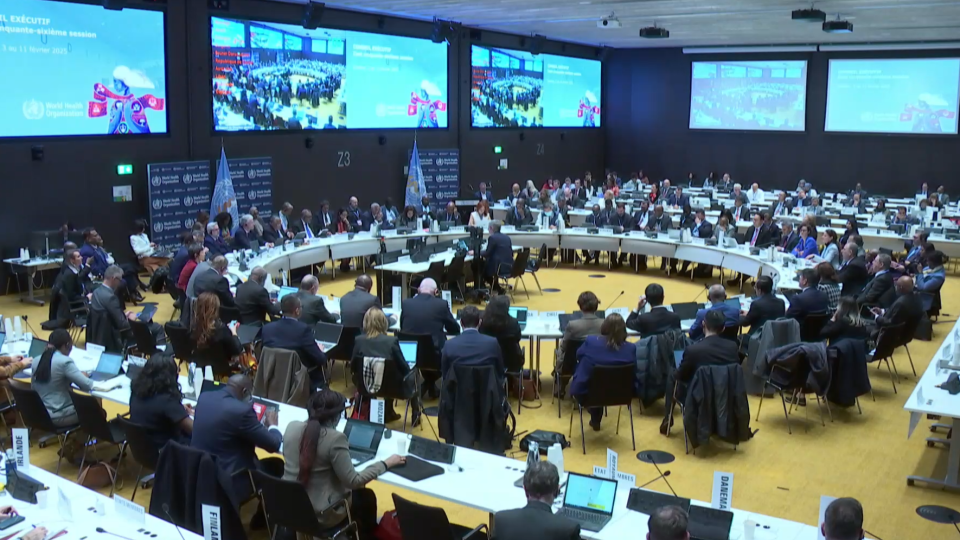ICN welcomes WHO and WEF focus on nursing but warns of effect of US withdrawal from WHO on nurse-led services

“Now is the time to put sustainable financing at the top of our global health agenda.”
Nursing was high on the agenda at this year’s World Health Organization Executive Board (WHO EB) sessions in Geneva, with key discussions on extending the Global Strategic Directions for Nursing and Midwifery as well as WHO’s “Workforce 2030” plan on human resources for health. However, the International Council of Nurses (ICN) warned that the withdrawal of the United States from WHO has already halted some nurse-led services, including vaccination programmes and care for people with HIV/AIDS.
Echoing ICN’s statement in January, Dr Pamela Cipriano, ICN’s President, said: “The US decision to withdraw from WHO means it is imperative that we accelerate our efforts to ensure sustainable and equitable global health financing. Without sustained investment in nursing and health, we will not be able to achieve our shared global goals to make sure that everyone, everywhere can access the care they need”.
Throughout the WHO EB meetings, ICN made interventions, followed the debates and participated in side meetings. Speaking at the closure, ICN Chief Executive Officer Howard Catton said that while important progress was made in recognizing the need to strengthen the nursing workforce, President Trump’s executive order to leave WHO weighed heavily on the week's proceedings as member states began to prioritize their budgets and finances. Additional US action to stop other crucial development aid funding through the dismantling of USAID has also compounded the vulnerability of thousands of people who rely on programmes that provide basic humanitarian and health care.
Mr Catton said: “Let's not forget that there are many hundreds of nurses in countries delivering public health programmes for people with HIV and AIDS, which have just stopped because the money has stopped. Our thoughts are very much with those colleagues. Our concern is that it will make it even more difficult to reach the Sustainable Development Goals and Universal Health Coverage.”
ICN intervened on critical topics at the WHO EB including Universal Health Coverage, climate change, mental health issues, the health care workforce and WHO’s Nursing and Midwifery Strategy. ICN’s statements highlighted the central role of nurses in all of these issues and called on WHO Member States to urgently address workforce shortages and strengthen nurse retention, education, leadership and practice to build resilient health systems worldwide.
Decisions made at the WHO EB meeting will now go to the World Health Assembly in May to be ratified before they can be acted on. A key focus will be extending the Global Strategic Directions for Nursing and Midwifery, which will be informed by the next State of the World’s Nursing report, due to be published in May.
Mr Catton highlighted the significance of nursing throughout the proceedings: “It was really pleasing to hear Members States talk about the positive contributions nurses are making in their countries, from expanding health care to improving access and addressing non-communicable diseases, and to hear them agree on the need to do more to support nurses and other health care workers.
‘This recognition must now spark real change. Currently, there are huge risks to global health; nursing can provide solutions to many of them, but only if the profession has the investment it needs to expand and meet growing global health care needs. In light of the US decision, ICN’s work to advocate for prioritizing nurses and health is more important than ever.”
Investment in health was also a central topic at the recent World Economic Forum meeting in Davos, Switzerland. ICN has supported the WEF’s work on health care, including as part of the Global Future Council on the Future of the Care Economy, and closely monitored the meetings, where several sessions highlighted the need for equitable and sustainable health financing. Key topics included debt relief for low- and middle-income countries, funding for prevention and innovation, investing in women’s health, and improving international financing flows to address the health impacts of climate change.
Dr Cipriano, said: “Several WEF meetings drew attention to a global crisis in health financing that is depriving billions of care. To achieve our universal health coverage goals, we must ensure that health care is both accessible and affordable. Currently, out-of-pocket medical costs are pushing billions into poverty and nurses are seeing patients forced to choose between basic needs and lifesaving care while they themselves work in understaffed, under-resourced facilities.
‘Furthermore, many low- and middle-income countries are trapped in cycles of debt distress, where they are spending more on servicing their debts than on services like health and education. We will be watching closely as countries convene this summer for the Fourth International Conference on Financing for Development where restructuring of international financing and reducing crippling debt burdens are needed to open fiscal space for more investment in health and, ultimately, in nursing. Both the WHO Executive Board and WEF meetings show that now is the time to put sustainable financing at the top of our global health agenda.”
Click here to see ICN’s interventions at the WHO Executive Board meeting, and watch WEF interview with ICN CEO here.